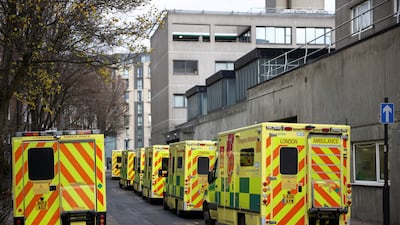Some UK accident and emergency departments are in a “complete state of crisis”, the Royal College of Emergency Medicine has said.
Dr Ian Higginson, the college's vice-president, said the situation endangers patients.
The warning follows a claim by another senior health official who said as many as 500 people could be dying each week because of delays to emergency care.
On Sunday, the government was urged to declare a national NHS major incident to rescue the healthcare system from the current crisis.
The move would mean all four UK nations would co-ordinate their response and allocate resources to help meet the overwhelming demand for care that is felt by many hospitals around the country.
"Emergency departments are in a really difficult and in some cases a complete state of crisis right now ... and in many cases we are unable to provide care at the standard we would like,” Dr Higginson told BBC Radio 5 Live.
"There's no doubt that if you can't get an ambulance to someone who's having a heart attack or a stroke, that some of those patients are going to come to harm and may die as a result of that.
"And there's no doubt that when we're trying to treat frail, elderly vulnerable patients on trolleys in corridors that we can't do the best thing by them. "
More investment is needed to support the health service, he said.
Chris Hopson from NHS England said it was evident the service was "under significant pressure" which he said could result in longer wait times.
He told BBC Radio 5 Live he feels "deeply uncomfortable" about the level of care sometimes being provided. And he said several factors were contributing to the crisis, including an increase in flu and Covid-19 patients, as well as delays in discharges and a rise in the number of people visiting A&E.
Dr Adrian Boyle, president of the Royal College of Emergency Medicine, believes waiting times for December will have been the worst he has ever seen, with more than a dozen NHS Trusts and ambulance services declaring critical incidents over the festive period.
He said: “What we're seeing now in terms of these long waits is being associated with increased mortality, and we think somewhere between 300 and 500 people are dying as a consequence of delays and problems with urgent and emergency care each week. We need to actually get a grip of this.”
A severe flu outbreak and rising Covid-19 cases are adding pressure to the system and overwhelming hospitals with patients.
Nurses strike in the UK - in pictures
The latest data from the NHS, which has been hit by strikes by nurses and paramedics in recent weeks, shows the number of flu patients in hospitals in England has jumped by nearly 80 per cent in a week.
There were 3,746 patients a day in hospital with flu in the week ending on Christmas Day, figures from NHS England show, up from 2,088 a day in the week before. The figures, published on Friday, showed an increase of 79.4 per cent.
In November, 37,837 patients waited more than 12 hours in A&E for a decision to be admitted to a hospital department, according to figures from NHS England.
This is an increase of almost 355 per cent compared with the previous November, when an estimated 10,646 patients waited more than 12 hours.
On Sunday, a senior health official urged the government to declare a national NHS major incident to rescue the healthcare system from the current crisis.
“The current situation in urgent and emergency care is shocking. It is in a critical state for patients and it is an extremely difficult for healthcare staff who are unable to deliver the care they want to," said Dr Tim Cooksley, president of the Society for Acute Medicine.
“Political leaders across the UK need to listen, meet urgently and accept the need to declare a national NHS major incident.
“The outcome must be a four-nation emergency strategy which results in short-term stabilisation, medium-term improvement and long-term growth. The grave situation we are in means it will be a long journey.
“Sustainable workforce and capacity plans are required urgently to boost morale among staff and patients – as we have long called for – and we now need to see action.”
Saffron Cordery, the interim chief executive of NHS Providers, said on New Year's Day the NHS was facing "equivalent levels of pressure" as it did during the early phase of the pandemic.
Dr Cooksley said many of the current problems are not new and recommendations had been outlined since the pandemic that offer the “best hope” of a short-term solution.













